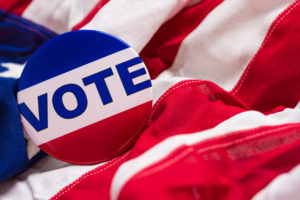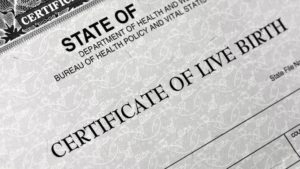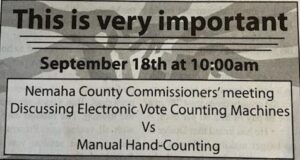Good morning everyone:
It’s been a wonderful weekend hanging out with friends. We started our weekend Friday night at one of the best events in Kansas City, a neighborhood barbecue held every year in Waldo. It’s an intimate gathering of several hundred people — if that can be called intimate — who gather in a Waldo neighborhood where you can sample great barbecue. We were stuffed in a little less than two hours. We could hardly eat Saturday. It was nice to run into one of our readers at the event who can vouch for the fact that Mrs. SSJ is not a make-believe character (sort of how you would hear about Norm’s wife on “Cheers” but never see her). Now on to the significant stories we published last week and other news you might have missed but need to know…
- State utility regulators have fined Kansas Gas Service for damage to its natural gas pipelines because it failed to accurately locate its underground lines for excavators.
- House Majority Leader Chris Croft has undergone eye surgery.
- Republican state Rep. Kristey Williams has drawn a primary foe.
- The Sierra Club is calling into question Gov. Laura Kelly’s support for the environment after she urged the U.S. Fish and Wildlife Service to back off immediately exercising its senior water rights for the Quivira National Wildlife Refuge.
- Gov. Laura Kelly is asking the federal government to back off its request to immediately exercise its senior water rights for the Quivira National Wildlife Refuge, saying it could lead to an abrupt change in farming practices that would “devastate” the region economically.
- The Kansas National Education Association is looking for a new executive director after Kevin Riemann left the teachers union late last month.
- Former President Donald Trump last week became the first Republican to file for the GOP primary in Kansas next year. There’s already a lawsuit filed by a Texas man — without legal representation — to keep him off the ballot.
- An interim Senate committee last week recommended that a former state Democratic lawmaker be confirmed to the Kansas Corporation Commission.
- The percentage of Kansans without health insurance fell in 2022, fueled partly by people purchasing health insurance on their own.
- Saying she wants something that’s “fair” and “workable,” U.S. District Judge Kathryn Vratil started putting together a plan for overseeing the Kansas Highway Patrol after finding that the agency violated the constitutional rights of motorists.
- A Kansas business executive and former Democratic congressional candidate has been named as the new international director at the Commerce Department.
GOP summer meeting
Republican Party Chairman Mike Brown has had a change of heart about closing the upcoming summer meeting of the party’s state committee to media.
On Friday in its weekly email to party members, the state GOP revealed it would now allow about 30 “observers” into the meeting on a first-come, first-served basis.
The party said space would be set aside specifically for media but would only be provided on a first-come, first-served basis as well.
This was an about-face from previous emails that emphatically stated that media outlets would not be allowed into the meeting.
Earlier emails said that this would be “specifically a no-media-allowed private meeting.”
Asked on Friday about changing his mind about opening the meeting, Brown said in a text message, “Yes, there is room.”
The meeting is set for 10 a.m. to 12:30 p.m. Sept. 30 in Paola.
Brown said last week that the meeting would be closed due to a lack of available space.
“We have important work to complete as a state committee as we move toward the 2024 presidential primary,” Brown said in a text message at the time.
However, there were questions about whether Brown had the authority to close the meeting without a vote of the state committee.
Former state Republican Party Chair Kelly Arnold said it would have been irregular to close the meeting.
In his 20 years serving on the state committee, Arnold said he could only recall maybe one time where the meeting was closed to go into executive session.
Cato comes out against voting law
The Cato Institute last week joined sides with the American Civil Liberties Union opposing a state law that bars the mailing of advanced ballot applications with personalized voter information.
Taking sides against conservative groups that support the law, Cato filed a brief urging the 10th U.S. Circuit Court of Appeals to find the law unconstitutional because it violates the First Amendment.
Distribution of prepopulated ballot applications is “expressive conduct and core political speech, both of which enjoy the highest level of constitutional protection,” the lawyers for Cato argued in their friend-of-the-court brief.
“The state’s criminalization of that conduct and speech takes aim at the heart of the First Amendment and suppresses constitutionally protected activity.”
In May, U.S. District Judge Kathryn Vratil found that the law, enacted in 2021, violated the constitutional right to free speech and association.
Vratil blocked the state from enforcing the ban after finding that it restricted the plaintiffs’ right to core political speech and association and that it was constitutionally overbroad.
Attorney General Kris Kobach appealed the decision to the 10th Circuit, and the case is now drawing attention from national groups.
The appeal focuses on the Voter Participation Center and its ability to send prepopulated ballot applications to voters with their personal information.
Cato argued the ban on personalized ballot applications creates a chilling effect on what the state admits ought to be lawful, expressive conduct and speech.
“The personalized application prohibition is not only unlawful as to the conduct that it
directly prohibits but also the range of conduct that it indirectly inhibits,” Cato argues.
“The fact that the provision raises the specter of criminal prosecution, and even jail time…without any scienter requirement supercharges this chilling effect.”
Cato says the state banned the Voter Participation Center’s preferred way of helping Kansans prepare to vote by imposing a blanket criminal prohibition on sending partially prepopulated ballot applications.
“As the Supreme Court has made clear, First Amendment rights would be ‘a hollow promise’ if the government were at liberty to ‘erode’ constitutional guarantees using
‘indirect restraints,'” Cato argues.
“By criminalizing transmittal of partially prepopulated applications, Kansas has ‘eroded’ and burdened its voters’ First Amendment freedom to petition the government.”
Meanwhile, ACLU chapters from Kansas, Colorado, New Mexico, Oklahoma, Utah and Wyoming filed a brief urging the court to affirm Vratil’s ruling.
They argue in their brief that the law criminalizes political speech.
They contend that the law prohibits groups such as the Voter Participation Center from
encouraging Kansans to vote by mail by prohibiting them from prefilling any “portion” of an application for an advance voting ballot even if the information supplied is accurate.
The ACLU chapters say the state is mistaken in arguing that First Amendment speech protections don’t apply to the Kansas law because the ban regulates the mechanics of the electoral process.
“The law regulates third-party advocacy, not electoral mechanics,” they argue.
“A voter who submits a pre-filled ballot application suffers no consequences under the law — there are no criminal penalties nor is the application invalidated.
“The law’s only effect is to punish third parties from encouraging voters to vote by mail.”
Four outside conservative groups are helping Kansas defend the law by filing briefs in support of the state’s position.
The Public Interest Legal Foundation, the Honest Elections Project, the Foundation for Government Accountability, and Restoring Integrity and Trust in Elections have filed friend-of-the-court briefs with the 10th U.S. Circuit Court of Appeals advocating for the law.
The four groups argued that Vratil erred in her conclusion that the law violated the Constitution.
They contend that completing a government form is not “core political speech,” and the ruling expands the First Amendment to include actions, not speech.
AT&T cuts 911 contract costs
AT&T has cut the cost of a proposed contract for a 911 service executive who serves as an intermediary between the company and the staffers who manage the system.
The contract ran into questions earlier this month when members of the 911 Coordinating Council started asking why the state is paying more for an AT&T staffer to provide real-time updates about any ongoing construction activities to restore emergency phone service.
The position doesn’t necessarily have influence on how fast an outage might be repaired, but functions more as an intermediary who can provide updates about the status of any repairs and when the service can be expected to be restored.
Last week, the council heard from administrators of the 911 system who emphasized why they need to have the service executive to address issues when outages occur.
The contract was set to lapse Friday, but AT&T came through with a reduced offer after members of the council said they were satisfied with the need for the service executive.
AT&T proposed a three-month extension for the contract at the existing rate of $16,220 a month. In December, that rate would move up to $19,972 a month, but still down from from the roughly $20,900 that was first proposed.
The council agreed to a three-month extension while the details of the final contract are ironed out. The contract price of $19,972 would last for three years.
The contract with AT&T for the service manager is separate from its service agreement to run the entire 911 system that cost $8.7 million last year.
The AT&T service contract is on a different billing cycle from the service manager agreements. The service is funded from a 90-cent fee tacked onto Kansas phone service.
During last week’s meeting, some members of the 911 council members expressed concern about losing the service manager, saying he plays a key role in troubleshooting issues and keeping 911 administrators up to date on repairs.
The service manager provides updates to emergency dispatchers about the status of getting the service back up and running when there is a service outage or fiber cut.
“The fact that the system is running as smooth as it is, leads me believe at this time that this individual is doing his job effectively,” said council member Jeremy Rabb, 911 director for Shawnee County.
“The ability to identify what that problem is, the potential resolution, the time frame, is going to come from an individual like the service manager,” Rabb said.
“I am cautious of just not having an individual with this capability on hand to tackle these problems,” he said.
Kelly administration stops gender marker changes
The state health department has stopped allowing transgender Kansans to change the gender markers on their birth certificates after a federal judge struck provisions in a court order allowing those changes to be made.
The Kansas Department of Health and Environment said it could no longer process gender identity amendments to birth certificates under Senate Bill 180, which establishes that an individual’s sex means their biological sex at birth.
The law requires schools, state agencies or any other government agency that collect vital statistics to identify individuals as either male or female at birth.
“If KDHE previously changed your birth certificate to align with your gender identity, that birth certificate is still valid,” the agency posted on its website.
“However, if a certified copy of that record is requested, then the new copy must reflect the sex assigned at birth, in accordance with SB 180,” the agency said.
Last month, a federal judge granted Attorney General Kris Kobach’s request to modify the terms of a 2019 consent agreement so it would keep transgender Kansans from correcting their gender marker on their birth certificates.
U.S. District Judge Daniel Crabtree found that circumstances had changed since the consent order was agreed to four years ago, namely the passage of a new law establishing that an individual’s sex means their biological sex at birth.
The judge struck provisions of the consent order allowing transgender Kansans to obtain birth certificates that reflect their sex consistent with their gender identity.
The federal court decision is different from the case playing out in state court, where Kobach is trying to stop Gov. Laura Kelly’s administration from allowing transgender Kansans to change gender markers on driver’s licenses.
A Shawnee County judge has already temporarily blocked the Kelly administration from changing gender markers on driver’s licenses.
Hand-counting ballots
There appears to be some kind of grassroots movement to force Nemaha County election officials to count ballots by hand.
It’s not clear how broad the effort is, but ads have been placed in the local newspaper urging residents to show up at a budget hearing set for Monday to discuss electronic voting machines compared to hand-counting ballots.
“Are you interested in changing from an electronic voting machine that counts our votes to manual hand-counting votes?” said one ad.
It urged residents to call Ron Gudenkauf, whose phone number and email address were listed in the ad.
“I don’t know if I have any comments I want to say right at the moment,” Gudenkauf said in a brief conversation last week before hanging up.
Gudenkauf said the effort to was “stop the machines” because of fraud. He said he had no evidence of voter fraud in Nemaha County.
The county is holding a budget hearing Monday because it expects to collect more revenue this year than last. The hearing is mandated by state law.
Commission Chair Jason Koch said he’s had “plenty of phone calls” about the effort.
He’s talked to members of the group. He said he’s cautioned them about having a plan if they want to cut the county’s budget for elections.
“If you want to adjust their budget, you better have some numbers for me to look at,” Koch said he told representatives of the group.
“Regardless of how you run an election, it costs money,” he said.
He said there will be a sign-up sheet for residents to speak at the hearing with an allotted amount of time.
Koch said he didn’t want the budget hearing to devolve into a discussion about whether Donald Trump lost the election or not. He said he expects to tamp down on that issue if it arises.
He’s happy to listen to residents’ thoughts about Trump, just not necessarily at a hearing to address the county budget.
“This is strictly budget,” he said. “If they feel that they can save the county money or whatever, I’ll be more than happy to listen to it. That’s what the budget hearing is for.”
Kansas poverty rate
The Census Bureau reported last week that the national poverty rate rose nearly five percentage points last year from 2021.
The data showed that the rate increased to 12.4% from 7.8% using the the supplemental poverty measure, which is the more comprehensive way to gauge poverty levels.
The 2022 poverty rate was also 0.6 percentage points higher than the pre-pandemic rate of 11.8% in 2019, the Census Bureau reported.
It was the first increase in the overall increase in the supplemental poverty measure since 2010, according to the Census Bureau.
Kansas Action for Children localized that data.
It found that the three-year average for the poverty rate in Kansas using the supplemental poverty measure was 7.1% from 2020 to 2022, up from 6% for 2019 to 2021. It was at 10% from 2015 to 2017.
The Kansas rate was lower than the national three-year average of 9.8% from 2020 to 2022, according to KAC. It was a 9.6% average nationally from 2019 to 2021.
“The data shows overall and child poverty has gone down within the last few years, partially due to the temporarily expanded federal child tax credit,” said John Wilson, president and CEO of Kansas Action for Children.
“But now, with that and other pandemic-era supports having ended, we are starting to see more Kansas families experience economic hardship,” Wilson said in a statement.
“The minimum wage has remained stagnant, inflated prices on food and gas is still stressing pocketbooks, and skyrocketing rent is forcing families to choose which bills to pay that month,” he said.
Reddy fundraising
Johnson County physician and congressional candidate Prasanth Reddy has a fundraiser scheduled for later this month that’s sponsored by some key Republican players.
The reception is scheduled for Sept. 28. Hosts include Republican donors Jay and Marjorie Robinow, business executive Brad Oddo, real estate developer Rick Oddo, construction executive Terry Dunn and former state Insurance Commissioner Ken Selzer.
Other hosts on the list were Fred and Brandy Wingert, Barbara Cloud and physician Stephen Thornton.
Reddy is seeking the 3rd District Congressional seat. He has a primary against businesswoman Karen Crnkovich and former White House fellow Jonathon Westbrook.
Lawmakers seek southern border troops
A coalition of six Republican lawmakers is collecting signatures on a letter urging Democratic Gov. Laura Kelly to send National Guard troops to the border.
The group is made up of Republican state Sens. Mark Steffen of Hutchinson and Alicia Straub of Ellinwood and state Reps. Trevor Jacobs of Fort Scott, Bill Rhiley of Wellington, Michael Murphy of Sylvia and Randy Garber of Sabetha.
They want to send the letter to the governor by Sept. 20. There was no indication last week how many lawmakers had signed the letter.
“We, as the elected officials of Kansas, must join to combat President Biden’s ongoing border crisis, and ensure the safety and security that all Americans and Kansans deserve,” the letter says.
“We must stand with the oath we all took to defend and protect the Constitution
and the American people,” the letter states.
“Already, our neighboring states of Missouri, Nebraska, and Oklahoma have stepped up to help fill in the dangerous gaps created by President Biden’s failed open border policies.
“Additionally, the governor of Idaho deployed a team of Idaho State Police personnel to support Texas’ border security efforts in a monthlong mission to prevent the smuggling of people and illicit drugs like fentanyl into America. …
“Therefore, we implore you, Gov. Kelly, to stand with the other 14 states and help defend our southern borders by sending the necessary resources including Kansas National Guard troops to stop this negligent disregard for America’s national security.”
A ‘smut’ discussion
The Topeka Capital-Journal provides this dispatch about the back-and-forth at last week’s State Board of Education meeting over whether students were exposed to “smut” in the classroom. Republican members of the board voiced concern over some classroom material they thought was inappropriate, while other board members said the implication was unfair.
Class action suit filed in winter storm
Last week, two groups of Kansans filed lawsuits against natural gas producers and suppliers, charging them with inflating gas prices during a 2021 winter storm that sent temperatures plunging for a prolonged period.
Two lawsuits were filed in federal court alleging violations of the Kansas Consumer Protection Act, claiming that the companies profited off of the storm.
The first federal lawsuit was filed against BP Energy Company, Southwest Energy, Macquarie Energy, Energy Transfer, Tenaska Inc., MIECO and Rockpoint Gas Storage.
The second federal lawsuit was filed against BP, CIMA Energy, Macquarie Energy and Southwest Energy.
The lawsuits say that the companies charged prices for natural gas that exceeded more than 100 times, and on one day, more than 200 times, the price of gas before the storm hit in February 2021.
“Defendants profited handsomely from the incredible costs that the Kansas consumers must now pay for natural gas during Winter Storm Uri,” one lawsuit says.
The litigation notes that BP Energy reported profits for the first fiscal quarter of 2021 of $4.7 billion, compared with $1.4 billion profit for the fourth quarter 2020.
It also cites Energy Transfer reporting financial results of $5.04 billion, compared to $2.64 billion in the same fiscal quarter in the previous
Here’s more coverage of the lawsuit from KWCH television.
Disorderly conduct dispute
Last week, the Kansas Supreme Court took up a legal dispute over the city of Wichita’s disorderly conduct ordinance and whether it violates free speech rights. The case focuses on Gabrielle Griffie, who led a protest over the death of George Floyd in 2021. Authorities didn’t arrest anyone on the day of the protest but later charged charged Griffie with unlawful assembly under the city’s disorderly conduct ordinance for blocking traffic.
After the municipal court found Griffie guilty, she appealed to the Sedgwick County District Court and requested a jury trial. Griffie arguedthe district court should strike down the disorderly conduct provision used to support the unlawful assembly charge as unconstitutionally overbroad because it prohibited a wide range of expressive conduct protected under the First Amendment.
The district court denied Griffie’s request, and a jury found her guilty of unlawful assembly under the “noisy conduct” definition of the ordinance. Griffie argued that the “noisy conduct” provision of the law was unconstitutional because it broadly prohibits noisy
conduct regardless of whether it’s protected by the First Amendment. The ordinance defines disorderly conduct as “using fighting words or engaging in noisy conduct tending to reasonably arouse alarm, anger or resentment in others.”
Griffie appealed, renewing her constitutional challenge. The Court of Appeals upheld the conviction on a 2-1 decision. Here’s the appeals court decision in the case, which lays out the facts very well. Here’s coverage of the case from the Wichita Eagle, Kansas News Service, and the Wichita Beacon.













